Personal Skills Audit and Professional Development Plan for Tourism
VerifiedAdded on 2020/10/04
|12
|3938
|332
Report
AI Summary
This report presents a comprehensive personal skill audit and professional development plan, focusing on the tourism industry and the company Cox and Kings. It begins with an introduction highlighting the importance of professional skills in a competitive environment and the role of continuous development. The report then explores the benefits of ongoing professional development for various stakeholders, including employers and employees, followed by an investigation into the professional expectations of skills and competencies for a tourism manager role. A self-assessment using SWOT analysis evaluates the author's abilities, skills, and competencies, identifying strengths, weaknesses, opportunities, and threats. The report reviews various learning theories and approaches, such as Honey and Mumford's learning styles, behavioral approach, social learning, Kolb's learning theory, and Bandura's self-efficacy theory. Finally, it includes a job interview analysis, discussing the strengths and weaknesses of the process. The report concludes by emphasizing the importance of continuous learning and development for career growth.
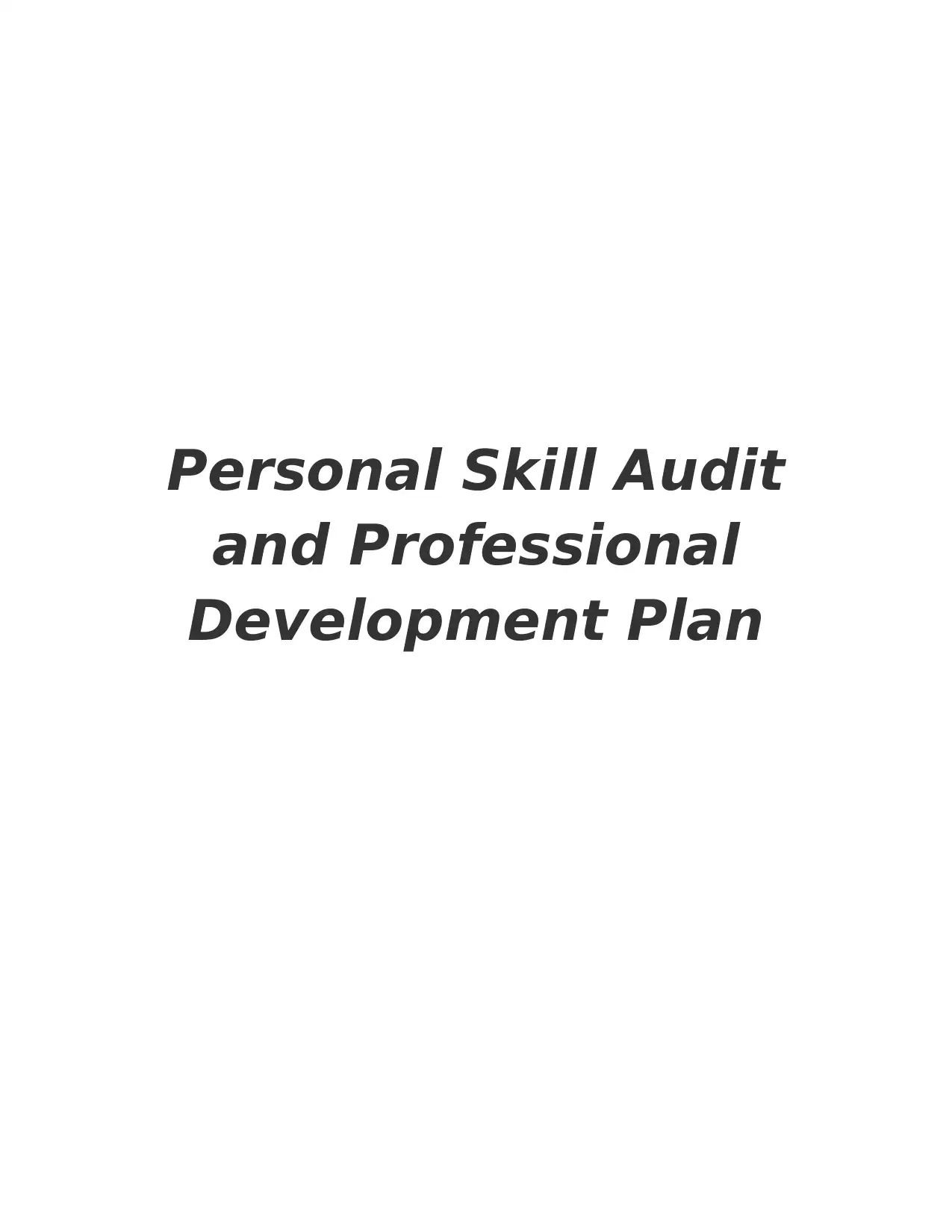
Personal Skill Audit
and Professional
Development Plan
and Professional
Development Plan
Paraphrase This Document
Need a fresh take? Get an instant paraphrase of this document with our AI Paraphraser
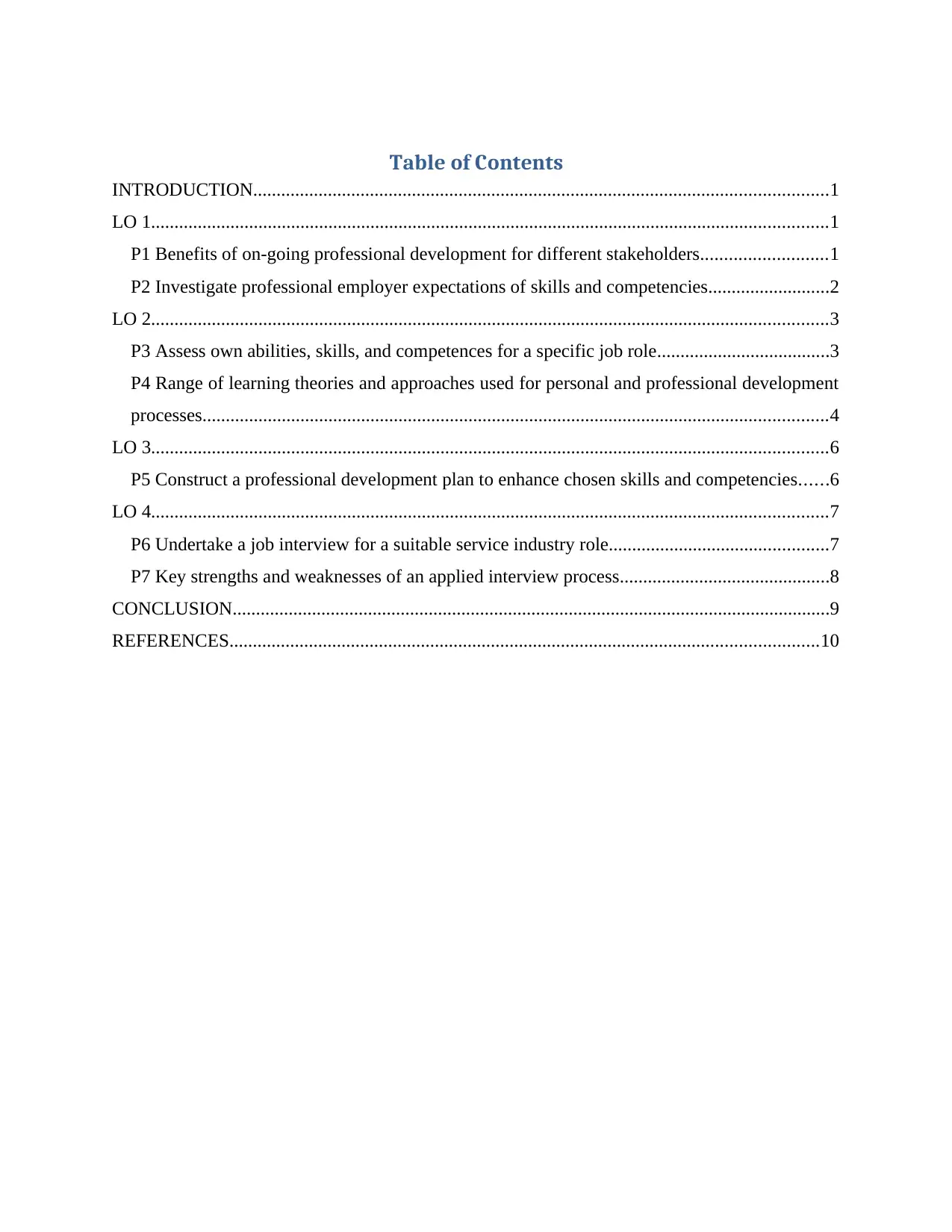
Table of Contents
INTRODUCTION...........................................................................................................................1
LO 1.................................................................................................................................................1
P1 Benefits of on-going professional development for different stakeholders...........................1
P2 Investigate professional employer expectations of skills and competencies..........................2
LO 2.................................................................................................................................................3
P3 Assess own abilities, skills, and competences for a specific job role.....................................3
P4 Range of learning theories and approaches used for personal and professional development
processes......................................................................................................................................4
LO 3.................................................................................................................................................6
P5 Construct a professional development plan to enhance chosen skills and competencies......6
LO 4.................................................................................................................................................7
P6 Undertake a job interview for a suitable service industry role...............................................7
P7 Key strengths and weaknesses of an applied interview process.............................................8
CONCLUSION................................................................................................................................9
REFERENCES..............................................................................................................................10
INTRODUCTION...........................................................................................................................1
LO 1.................................................................................................................................................1
P1 Benefits of on-going professional development for different stakeholders...........................1
P2 Investigate professional employer expectations of skills and competencies..........................2
LO 2.................................................................................................................................................3
P3 Assess own abilities, skills, and competences for a specific job role.....................................3
P4 Range of learning theories and approaches used for personal and professional development
processes......................................................................................................................................4
LO 3.................................................................................................................................................6
P5 Construct a professional development plan to enhance chosen skills and competencies......6
LO 4.................................................................................................................................................7
P6 Undertake a job interview for a suitable service industry role...............................................7
P7 Key strengths and weaknesses of an applied interview process.............................................8
CONCLUSION................................................................................................................................9
REFERENCES..............................................................................................................................10
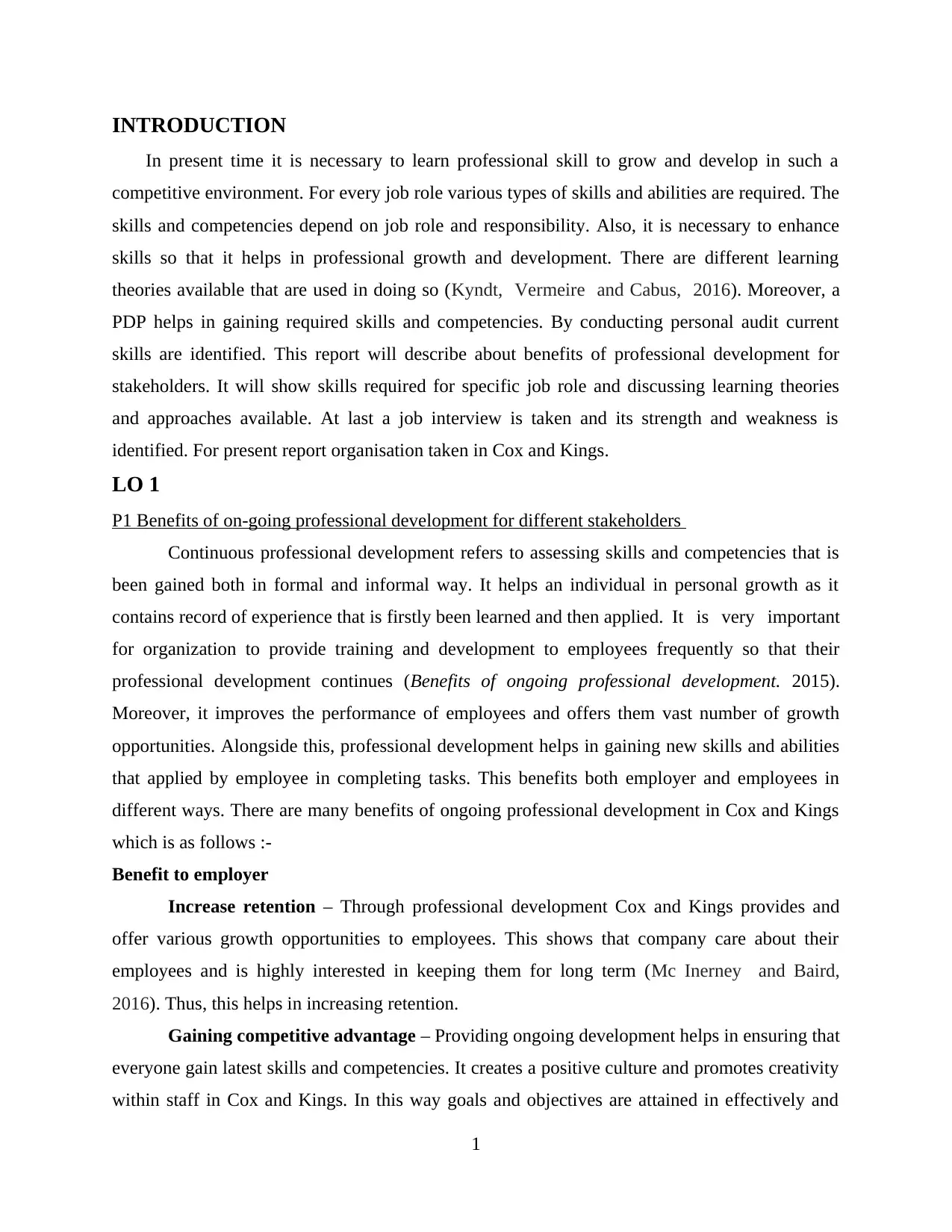
INTRODUCTION
In present time it is necessary to learn professional skill to grow and develop in such a
competitive environment. For every job role various types of skills and abilities are required. The
skills and competencies depend on job role and responsibility. Also, it is necessary to enhance
skills so that it helps in professional growth and development. There are different learning
theories available that are used in doing so (Kyndt, Vermeire and Cabus, 2016). Moreover, a
PDP helps in gaining required skills and competencies. By conducting personal audit current
skills are identified. This report will describe about benefits of professional development for
stakeholders. It will show skills required for specific job role and discussing learning theories
and approaches available. At last a job interview is taken and its strength and weakness is
identified. For present report organisation taken in Cox and Kings.
LO 1
P1 Benefits of on-going professional development for different stakeholders
Continuous professional development refers to assessing skills and competencies that is
been gained both in formal and informal way. It helps an individual in personal growth as it
contains record of experience that is firstly been learned and then applied. It is very important
for organization to provide training and development to employees frequently so that their
professional development continues (Benefits of ongoing professional development. 2015).
Moreover, it improves the performance of employees and offers them vast number of growth
opportunities. Alongside this, professional development helps in gaining new skills and abilities
that applied by employee in completing tasks. This benefits both employer and employees in
different ways. There are many benefits of ongoing professional development in Cox and Kings
which is as follows :-
Benefit to employer
Increase retention – Through professional development Cox and Kings provides and
offer various growth opportunities to employees. This shows that company care about their
employees and is highly interested in keeping them for long term (Mc Inerney and Baird,
2016). Thus, this helps in increasing retention.
Gaining competitive advantage – Providing ongoing development helps in ensuring that
everyone gain latest skills and competencies. It creates a positive culture and promotes creativity
within staff in Cox and Kings. In this way goals and objectives are attained in effectively and
1
In present time it is necessary to learn professional skill to grow and develop in such a
competitive environment. For every job role various types of skills and abilities are required. The
skills and competencies depend on job role and responsibility. Also, it is necessary to enhance
skills so that it helps in professional growth and development. There are different learning
theories available that are used in doing so (Kyndt, Vermeire and Cabus, 2016). Moreover, a
PDP helps in gaining required skills and competencies. By conducting personal audit current
skills are identified. This report will describe about benefits of professional development for
stakeholders. It will show skills required for specific job role and discussing learning theories
and approaches available. At last a job interview is taken and its strength and weakness is
identified. For present report organisation taken in Cox and Kings.
LO 1
P1 Benefits of on-going professional development for different stakeholders
Continuous professional development refers to assessing skills and competencies that is
been gained both in formal and informal way. It helps an individual in personal growth as it
contains record of experience that is firstly been learned and then applied. It is very important
for organization to provide training and development to employees frequently so that their
professional development continues (Benefits of ongoing professional development. 2015).
Moreover, it improves the performance of employees and offers them vast number of growth
opportunities. Alongside this, professional development helps in gaining new skills and abilities
that applied by employee in completing tasks. This benefits both employer and employees in
different ways. There are many benefits of ongoing professional development in Cox and Kings
which is as follows :-
Benefit to employer
Increase retention – Through professional development Cox and Kings provides and
offer various growth opportunities to employees. This shows that company care about their
employees and is highly interested in keeping them for long term (Mc Inerney and Baird,
2016). Thus, this helps in increasing retention.
Gaining competitive advantage – Providing ongoing development helps in ensuring that
everyone gain latest skills and competencies. It creates a positive culture and promotes creativity
within staff in Cox and Kings. In this way goals and objectives are attained in effectively and
1
⊘ This is a preview!⊘
Do you want full access?
Subscribe today to unlock all pages.

Trusted by 1+ million students worldwide
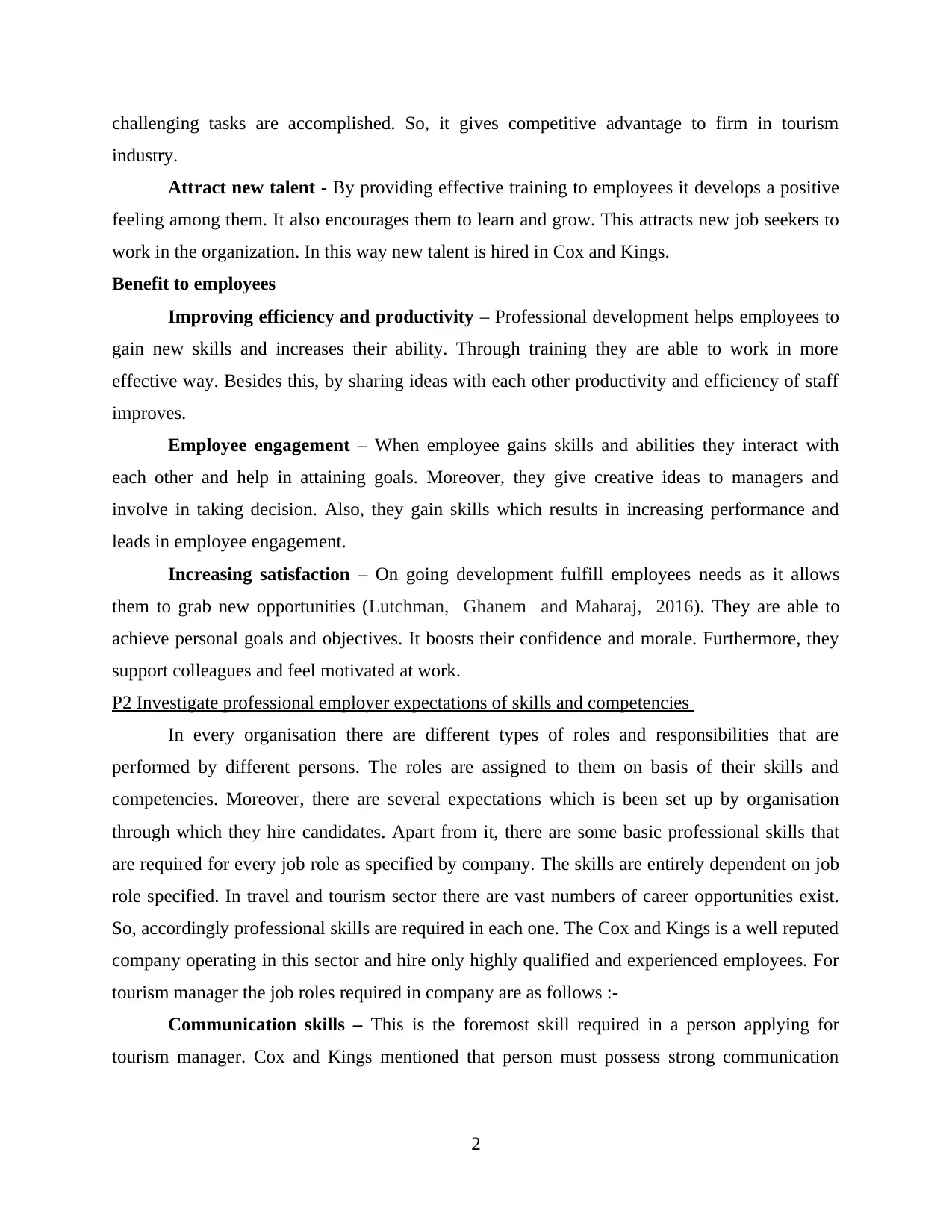
challenging tasks are accomplished. So, it gives competitive advantage to firm in tourism
industry.
Attract new talent - By providing effective training to employees it develops a positive
feeling among them. It also encourages them to learn and grow. This attracts new job seekers to
work in the organization. In this way new talent is hired in Cox and Kings.
Benefit to employees
Improving efficiency and productivity – Professional development helps employees to
gain new skills and increases their ability. Through training they are able to work in more
effective way. Besides this, by sharing ideas with each other productivity and efficiency of staff
improves.
Employee engagement – When employee gains skills and abilities they interact with
each other and help in attaining goals. Moreover, they give creative ideas to managers and
involve in taking decision. Also, they gain skills which results in increasing performance and
leads in employee engagement.
Increasing satisfaction – On going development fulfill employees needs as it allows
them to grab new opportunities (Lutchman, Ghanem and Maharaj, 2016). They are able to
achieve personal goals and objectives. It boosts their confidence and morale. Furthermore, they
support colleagues and feel motivated at work.
P2 Investigate professional employer expectations of skills and competencies
In every organisation there are different types of roles and responsibilities that are
performed by different persons. The roles are assigned to them on basis of their skills and
competencies. Moreover, there are several expectations which is been set up by organisation
through which they hire candidates. Apart from it, there are some basic professional skills that
are required for every job role as specified by company. The skills are entirely dependent on job
role specified. In travel and tourism sector there are vast numbers of career opportunities exist.
So, accordingly professional skills are required in each one. The Cox and Kings is a well reputed
company operating in this sector and hire only highly qualified and experienced employees. For
tourism manager the job roles required in company are as follows :-
Communication skills – This is the foremost skill required in a person applying for
tourism manager. Cox and Kings mentioned that person must possess strong communication
2
industry.
Attract new talent - By providing effective training to employees it develops a positive
feeling among them. It also encourages them to learn and grow. This attracts new job seekers to
work in the organization. In this way new talent is hired in Cox and Kings.
Benefit to employees
Improving efficiency and productivity – Professional development helps employees to
gain new skills and increases their ability. Through training they are able to work in more
effective way. Besides this, by sharing ideas with each other productivity and efficiency of staff
improves.
Employee engagement – When employee gains skills and abilities they interact with
each other and help in attaining goals. Moreover, they give creative ideas to managers and
involve in taking decision. Also, they gain skills which results in increasing performance and
leads in employee engagement.
Increasing satisfaction – On going development fulfill employees needs as it allows
them to grab new opportunities (Lutchman, Ghanem and Maharaj, 2016). They are able to
achieve personal goals and objectives. It boosts their confidence and morale. Furthermore, they
support colleagues and feel motivated at work.
P2 Investigate professional employer expectations of skills and competencies
In every organisation there are different types of roles and responsibilities that are
performed by different persons. The roles are assigned to them on basis of their skills and
competencies. Moreover, there are several expectations which is been set up by organisation
through which they hire candidates. Apart from it, there are some basic professional skills that
are required for every job role as specified by company. The skills are entirely dependent on job
role specified. In travel and tourism sector there are vast numbers of career opportunities exist.
So, accordingly professional skills are required in each one. The Cox and Kings is a well reputed
company operating in this sector and hire only highly qualified and experienced employees. For
tourism manager the job roles required in company are as follows :-
Communication skills – This is the foremost skill required in a person applying for
tourism manager. Cox and Kings mentioned that person must possess strong communication
2
Paraphrase This Document
Need a fresh take? Get an instant paraphrase of this document with our AI Paraphraser
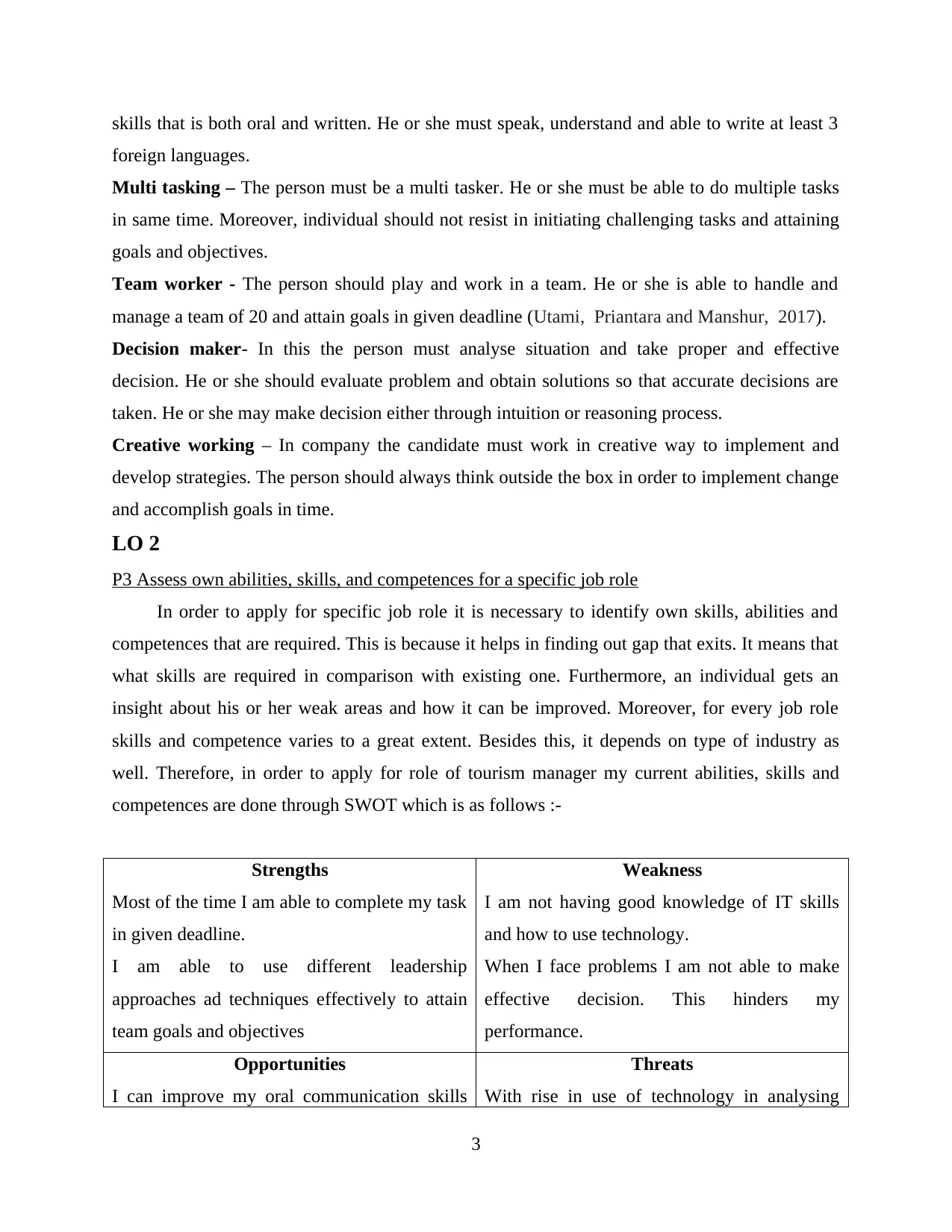
skills that is both oral and written. He or she must speak, understand and able to write at least 3
foreign languages.
Multi tasking – The person must be a multi tasker. He or she must be able to do multiple tasks
in same time. Moreover, individual should not resist in initiating challenging tasks and attaining
goals and objectives.
Team worker - The person should play and work in a team. He or she is able to handle and
manage a team of 20 and attain goals in given deadline (Utami, Priantara and Manshur, 2017).
Decision maker- In this the person must analyse situation and take proper and effective
decision. He or she should evaluate problem and obtain solutions so that accurate decisions are
taken. He or she may make decision either through intuition or reasoning process.
Creative working – In company the candidate must work in creative way to implement and
develop strategies. The person should always think outside the box in order to implement change
and accomplish goals in time.
LO 2
P3 Assess own abilities, skills, and competences for a specific job role
In order to apply for specific job role it is necessary to identify own skills, abilities and
competences that are required. This is because it helps in finding out gap that exits. It means that
what skills are required in comparison with existing one. Furthermore, an individual gets an
insight about his or her weak areas and how it can be improved. Moreover, for every job role
skills and competence varies to a great extent. Besides this, it depends on type of industry as
well. Therefore, in order to apply for role of tourism manager my current abilities, skills and
competences are done through SWOT which is as follows :-
Strengths
Most of the time I am able to complete my task
in given deadline.
I am able to use different leadership
approaches ad techniques effectively to attain
team goals and objectives
Weakness
I am not having good knowledge of IT skills
and how to use technology.
When I face problems I am not able to make
effective decision. This hinders my
performance.
Opportunities
I can improve my oral communication skills
Threats
With rise in use of technology in analysing
3
foreign languages.
Multi tasking – The person must be a multi tasker. He or she must be able to do multiple tasks
in same time. Moreover, individual should not resist in initiating challenging tasks and attaining
goals and objectives.
Team worker - The person should play and work in a team. He or she is able to handle and
manage a team of 20 and attain goals in given deadline (Utami, Priantara and Manshur, 2017).
Decision maker- In this the person must analyse situation and take proper and effective
decision. He or she should evaluate problem and obtain solutions so that accurate decisions are
taken. He or she may make decision either through intuition or reasoning process.
Creative working – In company the candidate must work in creative way to implement and
develop strategies. The person should always think outside the box in order to implement change
and accomplish goals in time.
LO 2
P3 Assess own abilities, skills, and competences for a specific job role
In order to apply for specific job role it is necessary to identify own skills, abilities and
competences that are required. This is because it helps in finding out gap that exits. It means that
what skills are required in comparison with existing one. Furthermore, an individual gets an
insight about his or her weak areas and how it can be improved. Moreover, for every job role
skills and competence varies to a great extent. Besides this, it depends on type of industry as
well. Therefore, in order to apply for role of tourism manager my current abilities, skills and
competences are done through SWOT which is as follows :-
Strengths
Most of the time I am able to complete my task
in given deadline.
I am able to use different leadership
approaches ad techniques effectively to attain
team goals and objectives
Weakness
I am not having good knowledge of IT skills
and how to use technology.
When I face problems I am not able to make
effective decision. This hinders my
performance.
Opportunities
I can improve my oral communication skills
Threats
With rise in use of technology in analysing
3
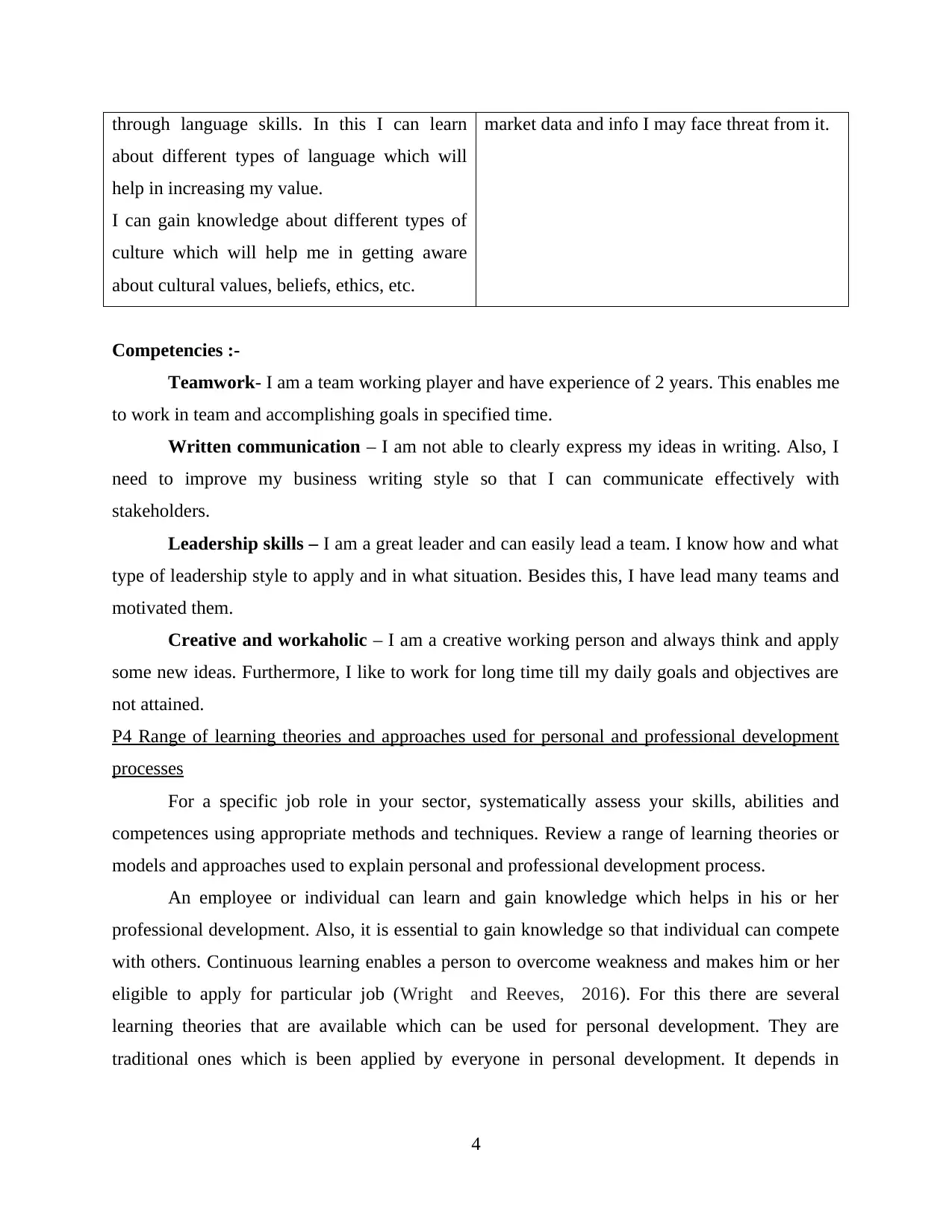
through language skills. In this I can learn
about different types of language which will
help in increasing my value.
I can gain knowledge about different types of
culture which will help me in getting aware
about cultural values, beliefs, ethics, etc.
market data and info I may face threat from it.
Competencies :-
Teamwork- I am a team working player and have experience of 2 years. This enables me
to work in team and accomplishing goals in specified time.
Written communication – I am not able to clearly express my ideas in writing. Also, I
need to improve my business writing style so that I can communicate effectively with
stakeholders.
Leadership skills – I am a great leader and can easily lead a team. I know how and what
type of leadership style to apply and in what situation. Besides this, I have lead many teams and
motivated them.
Creative and workaholic – I am a creative working person and always think and apply
some new ideas. Furthermore, I like to work for long time till my daily goals and objectives are
not attained.
P4 Range of learning theories and approaches used for personal and professional development
processes
For a specific job role in your sector, systematically assess your skills, abilities and
competences using appropriate methods and techniques. Review a range of learning theories or
models and approaches used to explain personal and professional development process.
An employee or individual can learn and gain knowledge which helps in his or her
professional development. Also, it is essential to gain knowledge so that individual can compete
with others. Continuous learning enables a person to overcome weakness and makes him or her
eligible to apply for particular job (Wright and Reeves, 2016). For this there are several
learning theories that are available which can be used for personal development. They are
traditional ones which is been applied by everyone in personal development. It depends in
4
about different types of language which will
help in increasing my value.
I can gain knowledge about different types of
culture which will help me in getting aware
about cultural values, beliefs, ethics, etc.
market data and info I may face threat from it.
Competencies :-
Teamwork- I am a team working player and have experience of 2 years. This enables me
to work in team and accomplishing goals in specified time.
Written communication – I am not able to clearly express my ideas in writing. Also, I
need to improve my business writing style so that I can communicate effectively with
stakeholders.
Leadership skills – I am a great leader and can easily lead a team. I know how and what
type of leadership style to apply and in what situation. Besides this, I have lead many teams and
motivated them.
Creative and workaholic – I am a creative working person and always think and apply
some new ideas. Furthermore, I like to work for long time till my daily goals and objectives are
not attained.
P4 Range of learning theories and approaches used for personal and professional development
processes
For a specific job role in your sector, systematically assess your skills, abilities and
competences using appropriate methods and techniques. Review a range of learning theories or
models and approaches used to explain personal and professional development process.
An employee or individual can learn and gain knowledge which helps in his or her
professional development. Also, it is essential to gain knowledge so that individual can compete
with others. Continuous learning enables a person to overcome weakness and makes him or her
eligible to apply for particular job (Wright and Reeves, 2016). For this there are several
learning theories that are available which can be used for personal development. They are
traditional ones which is been applied by everyone in personal development. It depends in
4
⊘ This is a preview!⊘
Do you want full access?
Subscribe today to unlock all pages.

Trusted by 1+ million students worldwide
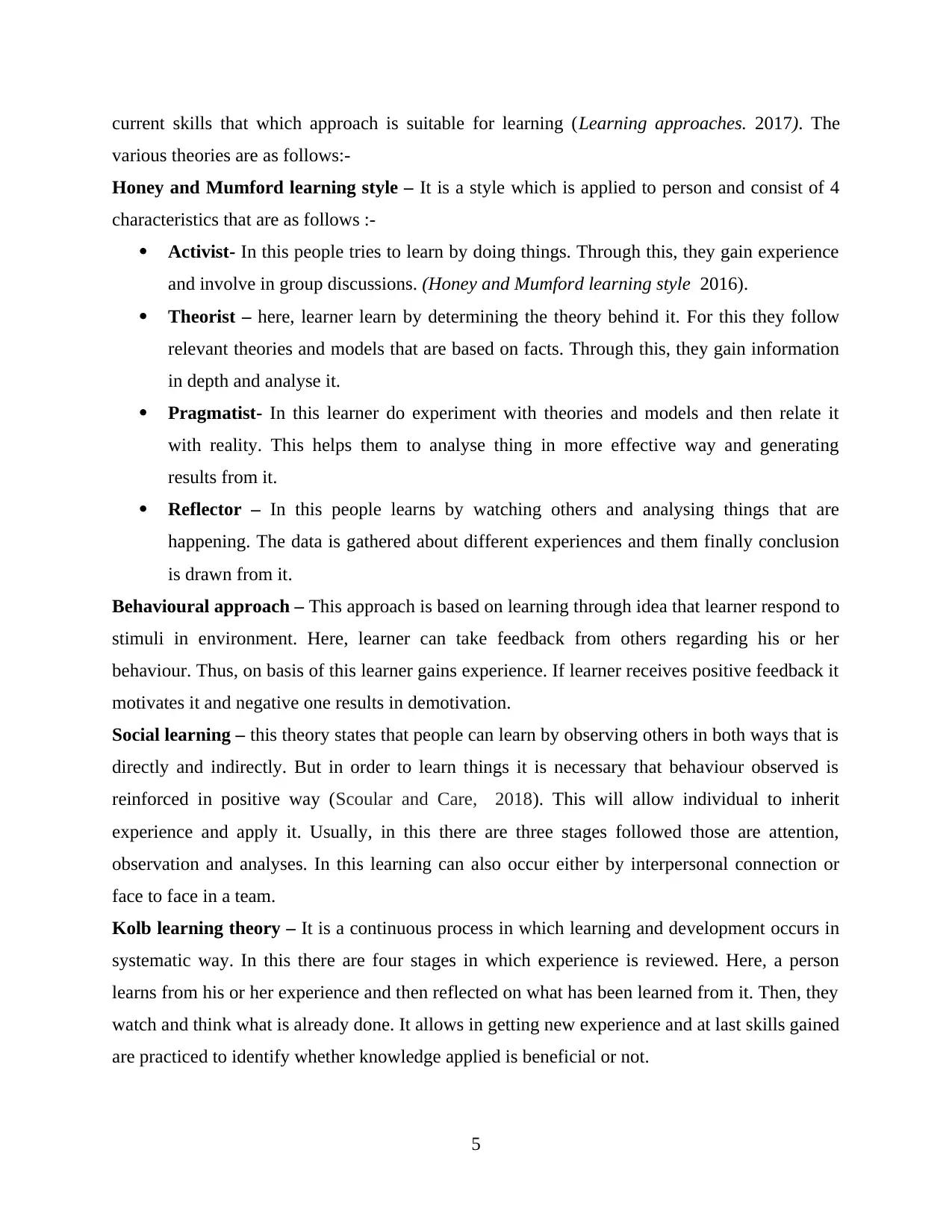
current skills that which approach is suitable for learning (Learning approaches. 2017). The
various theories are as follows:-
Honey and Mumford learning style – It is a style which is applied to person and consist of 4
characteristics that are as follows :-
Activist- In this people tries to learn by doing things. Through this, they gain experience
and involve in group discussions. (Honey and Mumford learning style 2016).
Theorist – here, learner learn by determining the theory behind it. For this they follow
relevant theories and models that are based on facts. Through this, they gain information
in depth and analyse it.
Pragmatist- In this learner do experiment with theories and models and then relate it
with reality. This helps them to analyse thing in more effective way and generating
results from it.
Reflector – In this people learns by watching others and analysing things that are
happening. The data is gathered about different experiences and them finally conclusion
is drawn from it.
Behavioural approach – This approach is based on learning through idea that learner respond to
stimuli in environment. Here, learner can take feedback from others regarding his or her
behaviour. Thus, on basis of this learner gains experience. If learner receives positive feedback it
motivates it and negative one results in demotivation.
Social learning – this theory states that people can learn by observing others in both ways that is
directly and indirectly. But in order to learn things it is necessary that behaviour observed is
reinforced in positive way (Scoular and Care, 2018). This will allow individual to inherit
experience and apply it. Usually, in this there are three stages followed those are attention,
observation and analyses. In this learning can also occur either by interpersonal connection or
face to face in a team.
Kolb learning theory – It is a continuous process in which learning and development occurs in
systematic way. In this there are four stages in which experience is reviewed. Here, a person
learns from his or her experience and then reflected on what has been learned from it. Then, they
watch and think what is already done. It allows in getting new experience and at last skills gained
are practiced to identify whether knowledge applied is beneficial or not.
5
various theories are as follows:-
Honey and Mumford learning style – It is a style which is applied to person and consist of 4
characteristics that are as follows :-
Activist- In this people tries to learn by doing things. Through this, they gain experience
and involve in group discussions. (Honey and Mumford learning style 2016).
Theorist – here, learner learn by determining the theory behind it. For this they follow
relevant theories and models that are based on facts. Through this, they gain information
in depth and analyse it.
Pragmatist- In this learner do experiment with theories and models and then relate it
with reality. This helps them to analyse thing in more effective way and generating
results from it.
Reflector – In this people learns by watching others and analysing things that are
happening. The data is gathered about different experiences and them finally conclusion
is drawn from it.
Behavioural approach – This approach is based on learning through idea that learner respond to
stimuli in environment. Here, learner can take feedback from others regarding his or her
behaviour. Thus, on basis of this learner gains experience. If learner receives positive feedback it
motivates it and negative one results in demotivation.
Social learning – this theory states that people can learn by observing others in both ways that is
directly and indirectly. But in order to learn things it is necessary that behaviour observed is
reinforced in positive way (Scoular and Care, 2018). This will allow individual to inherit
experience and apply it. Usually, in this there are three stages followed those are attention,
observation and analyses. In this learning can also occur either by interpersonal connection or
face to face in a team.
Kolb learning theory – It is a continuous process in which learning and development occurs in
systematic way. In this there are four stages in which experience is reviewed. Here, a person
learns from his or her experience and then reflected on what has been learned from it. Then, they
watch and think what is already done. It allows in getting new experience and at last skills gained
are practiced to identify whether knowledge applied is beneficial or not.
5
Paraphrase This Document
Need a fresh take? Get an instant paraphrase of this document with our AI Paraphraser
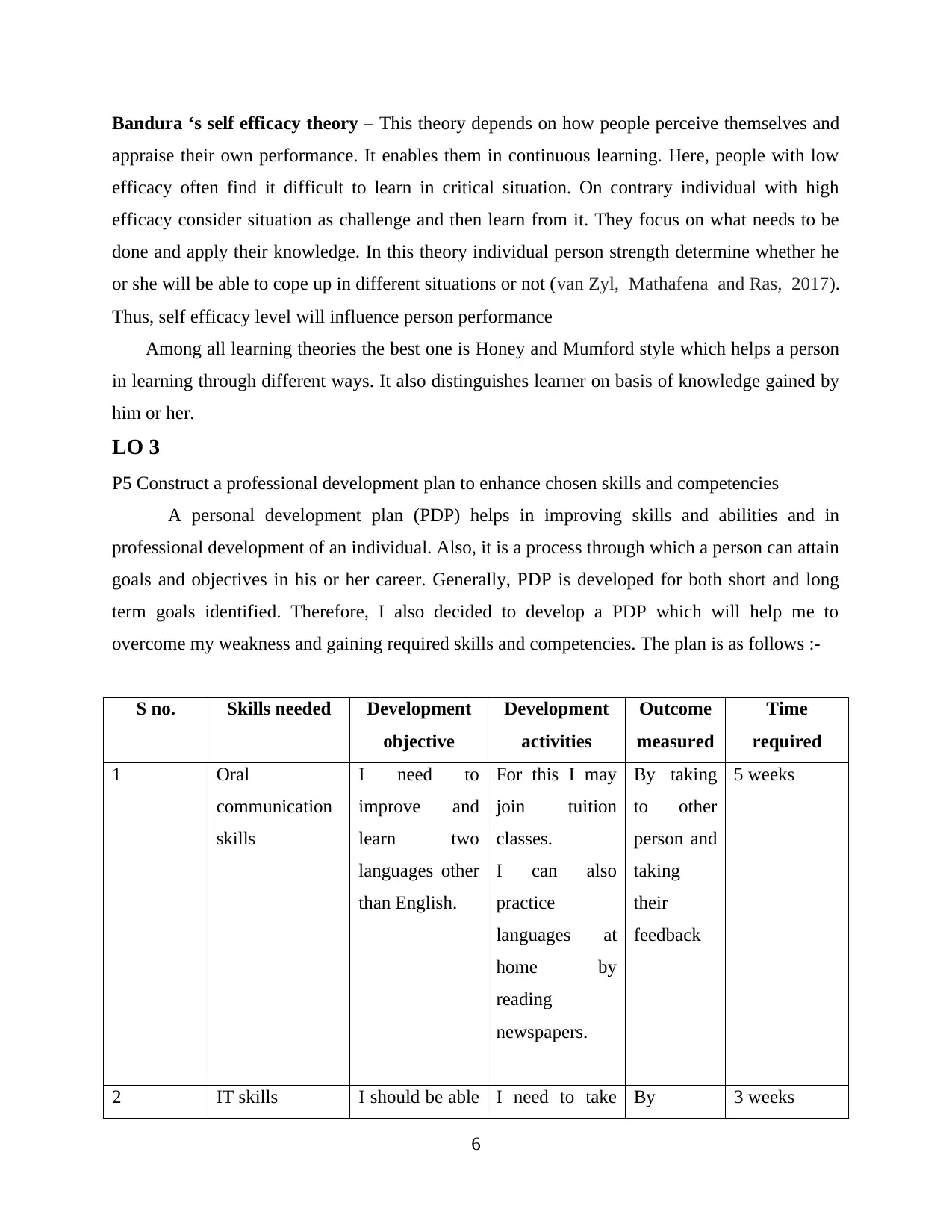
Bandura ‘s self efficacy theory – This theory depends on how people perceive themselves and
appraise their own performance. It enables them in continuous learning. Here, people with low
efficacy often find it difficult to learn in critical situation. On contrary individual with high
efficacy consider situation as challenge and then learn from it. They focus on what needs to be
done and apply their knowledge. In this theory individual person strength determine whether he
or she will be able to cope up in different situations or not (van Zyl, Mathafena and Ras, 2017).
Thus, self efficacy level will influence person performance
Among all learning theories the best one is Honey and Mumford style which helps a person
in learning through different ways. It also distinguishes learner on basis of knowledge gained by
him or her.
LO 3
P5 Construct a professional development plan to enhance chosen skills and competencies
A personal development plan (PDP) helps in improving skills and abilities and in
professional development of an individual. Also, it is a process through which a person can attain
goals and objectives in his or her career. Generally, PDP is developed for both short and long
term goals identified. Therefore, I also decided to develop a PDP which will help me to
overcome my weakness and gaining required skills and competencies. The plan is as follows :-
S no. Skills needed Development
objective
Development
activities
Outcome
measured
Time
required
1 Oral
communication
skills
I need to
improve and
learn two
languages other
than English.
For this I may
join tuition
classes.
I can also
practice
languages at
home by
reading
newspapers.
By taking
to other
person and
taking
their
feedback
5 weeks
2 IT skills I should be able I need to take By 3 weeks
6
appraise their own performance. It enables them in continuous learning. Here, people with low
efficacy often find it difficult to learn in critical situation. On contrary individual with high
efficacy consider situation as challenge and then learn from it. They focus on what needs to be
done and apply their knowledge. In this theory individual person strength determine whether he
or she will be able to cope up in different situations or not (van Zyl, Mathafena and Ras, 2017).
Thus, self efficacy level will influence person performance
Among all learning theories the best one is Honey and Mumford style which helps a person
in learning through different ways. It also distinguishes learner on basis of knowledge gained by
him or her.
LO 3
P5 Construct a professional development plan to enhance chosen skills and competencies
A personal development plan (PDP) helps in improving skills and abilities and in
professional development of an individual. Also, it is a process through which a person can attain
goals and objectives in his or her career. Generally, PDP is developed for both short and long
term goals identified. Therefore, I also decided to develop a PDP which will help me to
overcome my weakness and gaining required skills and competencies. The plan is as follows :-
S no. Skills needed Development
objective
Development
activities
Outcome
measured
Time
required
1 Oral
communication
skills
I need to
improve and
learn two
languages other
than English.
For this I may
join tuition
classes.
I can also
practice
languages at
home by
reading
newspapers.
By taking
to other
person and
taking
their
feedback
5 weeks
2 IT skills I should be able I need to take By 3 weeks
6
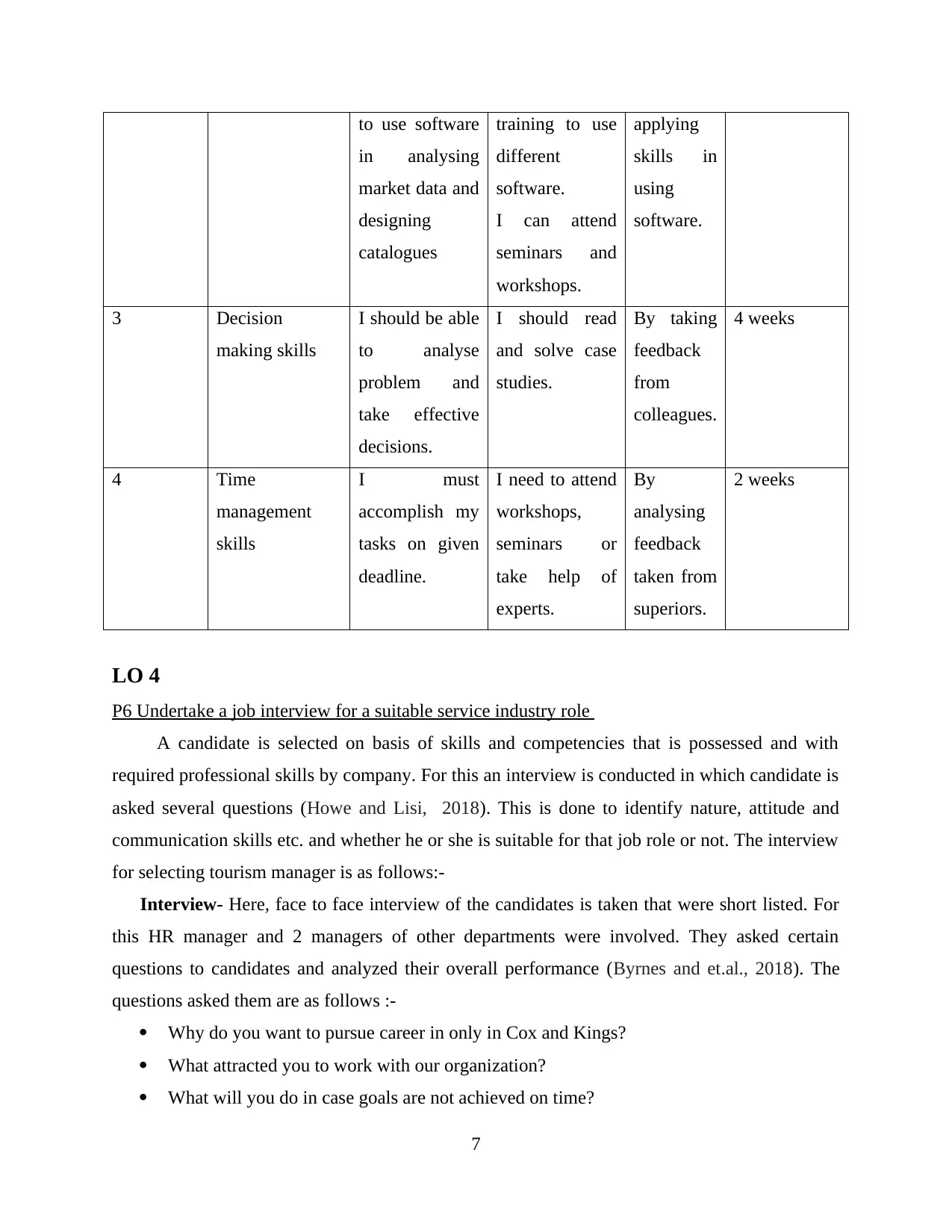
to use software
in analysing
market data and
designing
catalogues
training to use
different
software.
I can attend
seminars and
workshops.
applying
skills in
using
software.
3 Decision
making skills
I should be able
to analyse
problem and
take effective
decisions.
I should read
and solve case
studies.
By taking
feedback
from
colleagues.
4 weeks
4 Time
management
skills
I must
accomplish my
tasks on given
deadline.
I need to attend
workshops,
seminars or
take help of
experts.
By
analysing
feedback
taken from
superiors.
2 weeks
LO 4
P6 Undertake a job interview for a suitable service industry role
A candidate is selected on basis of skills and competencies that is possessed and with
required professional skills by company. For this an interview is conducted in which candidate is
asked several questions (Howe and Lisi, 2018). This is done to identify nature, attitude and
communication skills etc. and whether he or she is suitable for that job role or not. The interview
for selecting tourism manager is as follows:-
Interview- Here, face to face interview of the candidates is taken that were short listed. For
this HR manager and 2 managers of other departments were involved. They asked certain
questions to candidates and analyzed their overall performance (Byrnes and et.al., 2018). The
questions asked them are as follows :-
Why do you want to pursue career in only in Cox and Kings?
What attracted you to work with our organization?
What will you do in case goals are not achieved on time?
7
in analysing
market data and
designing
catalogues
training to use
different
software.
I can attend
seminars and
workshops.
applying
skills in
using
software.
3 Decision
making skills
I should be able
to analyse
problem and
take effective
decisions.
I should read
and solve case
studies.
By taking
feedback
from
colleagues.
4 weeks
4 Time
management
skills
I must
accomplish my
tasks on given
deadline.
I need to attend
workshops,
seminars or
take help of
experts.
By
analysing
feedback
taken from
superiors.
2 weeks
LO 4
P6 Undertake a job interview for a suitable service industry role
A candidate is selected on basis of skills and competencies that is possessed and with
required professional skills by company. For this an interview is conducted in which candidate is
asked several questions (Howe and Lisi, 2018). This is done to identify nature, attitude and
communication skills etc. and whether he or she is suitable for that job role or not. The interview
for selecting tourism manager is as follows:-
Interview- Here, face to face interview of the candidates is taken that were short listed. For
this HR manager and 2 managers of other departments were involved. They asked certain
questions to candidates and analyzed their overall performance (Byrnes and et.al., 2018). The
questions asked them are as follows :-
Why do you want to pursue career in only in Cox and Kings?
What attracted you to work with our organization?
What will you do in case goals are not achieved on time?
7
⊘ This is a preview!⊘
Do you want full access?
Subscribe today to unlock all pages.

Trusted by 1+ million students worldwide
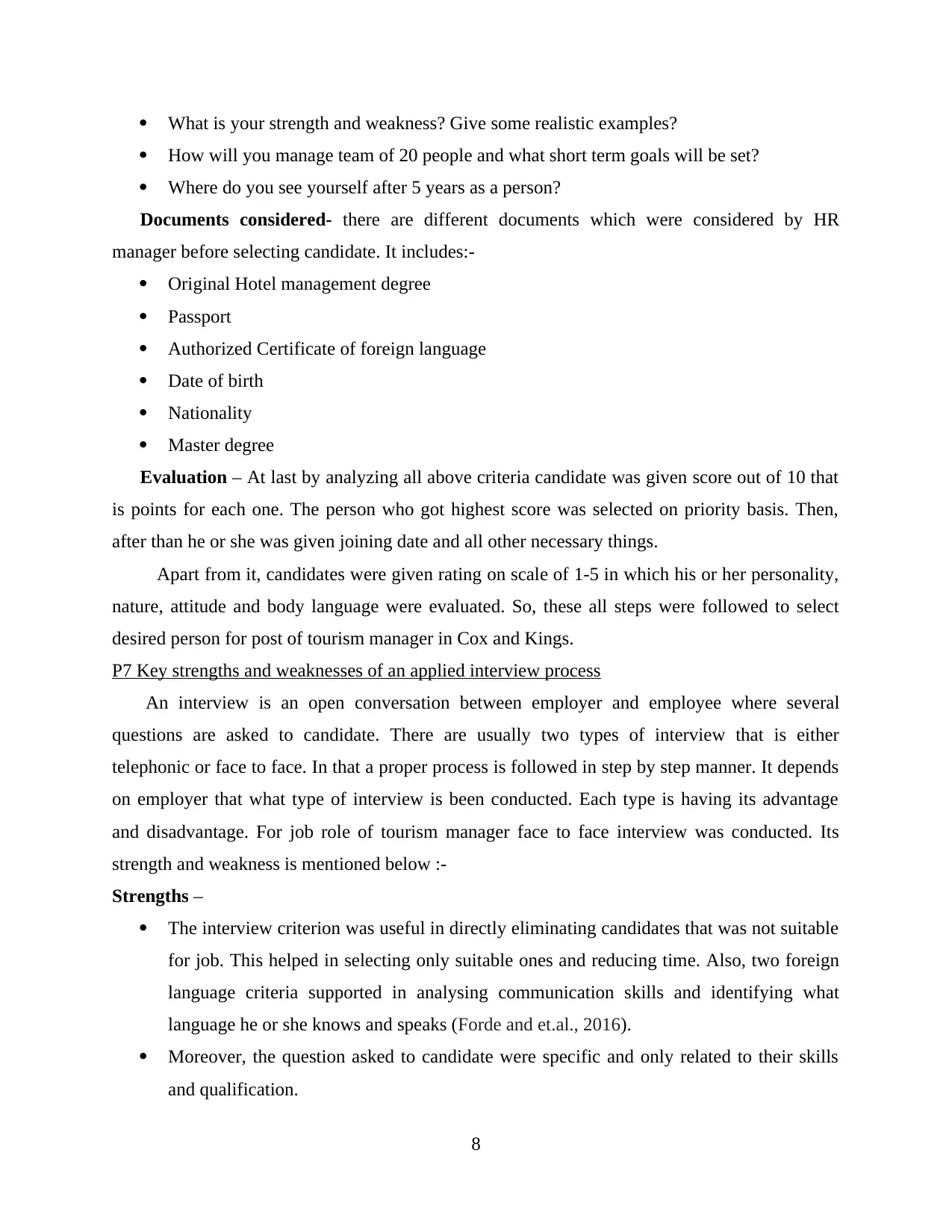
What is your strength and weakness? Give some realistic examples?
How will you manage team of 20 people and what short term goals will be set?
Where do you see yourself after 5 years as a person?
Documents considered- there are different documents which were considered by HR
manager before selecting candidate. It includes:-
Original Hotel management degree
Passport
Authorized Certificate of foreign language
Date of birth
Nationality
Master degree
Evaluation – At last by analyzing all above criteria candidate was given score out of 10 that
is points for each one. The person who got highest score was selected on priority basis. Then,
after than he or she was given joining date and all other necessary things.
Apart from it, candidates were given rating on scale of 1-5 in which his or her personality,
nature, attitude and body language were evaluated. So, these all steps were followed to select
desired person for post of tourism manager in Cox and Kings.
P7 Key strengths and weaknesses of an applied interview process
An interview is an open conversation between employer and employee where several
questions are asked to candidate. There are usually two types of interview that is either
telephonic or face to face. In that a proper process is followed in step by step manner. It depends
on employer that what type of interview is been conducted. Each type is having its advantage
and disadvantage. For job role of tourism manager face to face interview was conducted. Its
strength and weakness is mentioned below :-
Strengths –
The interview criterion was useful in directly eliminating candidates that was not suitable
for job. This helped in selecting only suitable ones and reducing time. Also, two foreign
language criteria supported in analysing communication skills and identifying what
language he or she knows and speaks (Forde and et.al., 2016).
Moreover, the question asked to candidate were specific and only related to their skills
and qualification.
8
How will you manage team of 20 people and what short term goals will be set?
Where do you see yourself after 5 years as a person?
Documents considered- there are different documents which were considered by HR
manager before selecting candidate. It includes:-
Original Hotel management degree
Passport
Authorized Certificate of foreign language
Date of birth
Nationality
Master degree
Evaluation – At last by analyzing all above criteria candidate was given score out of 10 that
is points for each one. The person who got highest score was selected on priority basis. Then,
after than he or she was given joining date and all other necessary things.
Apart from it, candidates were given rating on scale of 1-5 in which his or her personality,
nature, attitude and body language were evaluated. So, these all steps were followed to select
desired person for post of tourism manager in Cox and Kings.
P7 Key strengths and weaknesses of an applied interview process
An interview is an open conversation between employer and employee where several
questions are asked to candidate. There are usually two types of interview that is either
telephonic or face to face. In that a proper process is followed in step by step manner. It depends
on employer that what type of interview is been conducted. Each type is having its advantage
and disadvantage. For job role of tourism manager face to face interview was conducted. Its
strength and weakness is mentioned below :-
Strengths –
The interview criterion was useful in directly eliminating candidates that was not suitable
for job. This helped in selecting only suitable ones and reducing time. Also, two foreign
language criteria supported in analysing communication skills and identifying what
language he or she knows and speaks (Forde and et.al., 2016).
Moreover, the question asked to candidate were specific and only related to their skills
and qualification.
8
Paraphrase This Document
Need a fresh take? Get an instant paraphrase of this document with our AI Paraphraser
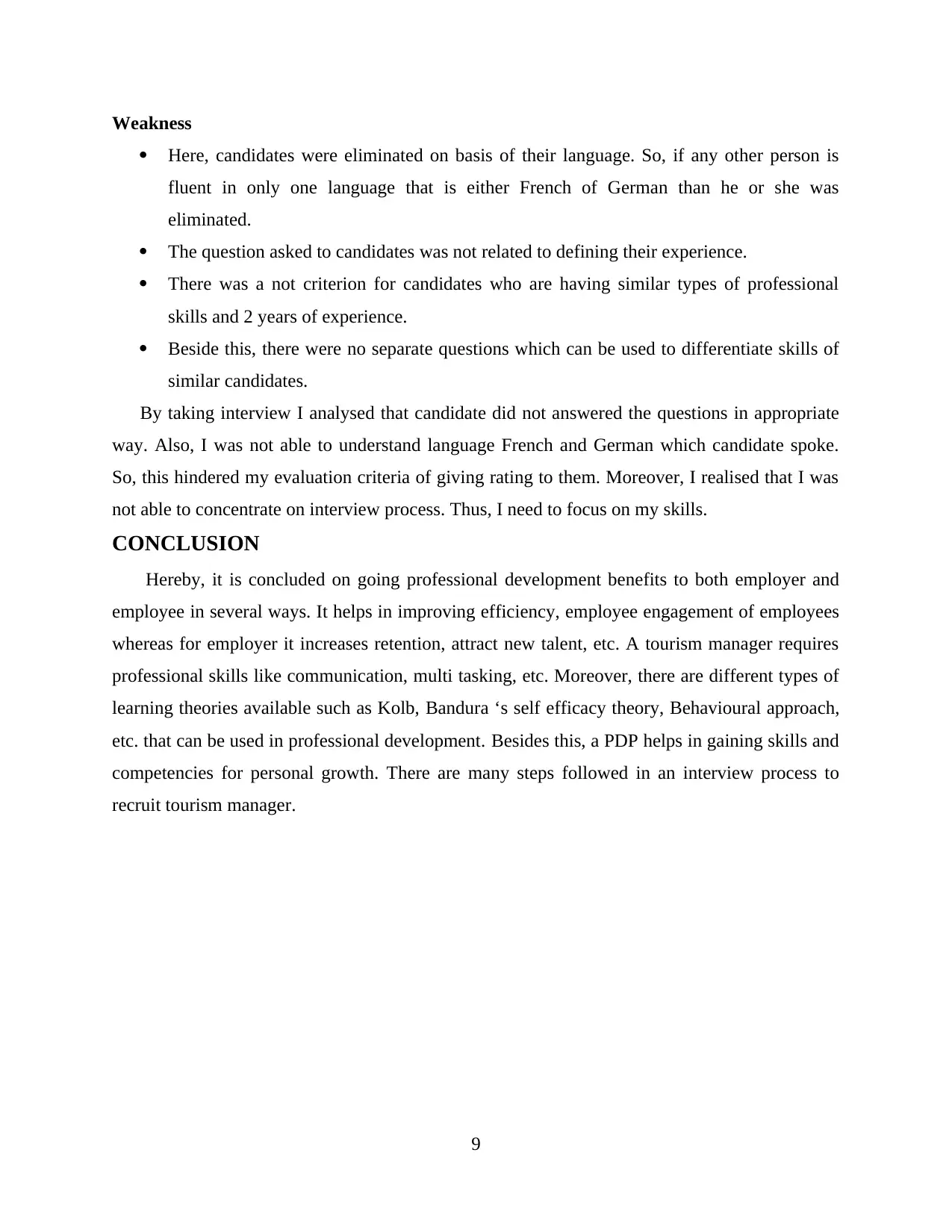
Weakness
Here, candidates were eliminated on basis of their language. So, if any other person is
fluent in only one language that is either French of German than he or she was
eliminated.
The question asked to candidates was not related to defining their experience.
There was a not criterion for candidates who are having similar types of professional
skills and 2 years of experience.
Beside this, there were no separate questions which can be used to differentiate skills of
similar candidates.
By taking interview I analysed that candidate did not answered the questions in appropriate
way. Also, I was not able to understand language French and German which candidate spoke.
So, this hindered my evaluation criteria of giving rating to them. Moreover, I realised that I was
not able to concentrate on interview process. Thus, I need to focus on my skills.
CONCLUSION
Hereby, it is concluded on going professional development benefits to both employer and
employee in several ways. It helps in improving efficiency, employee engagement of employees
whereas for employer it increases retention, attract new talent, etc. A tourism manager requires
professional skills like communication, multi tasking, etc. Moreover, there are different types of
learning theories available such as Kolb, Bandura ‘s self efficacy theory, Behavioural approach,
etc. that can be used in professional development. Besides this, a PDP helps in gaining skills and
competencies for personal growth. There are many steps followed in an interview process to
recruit tourism manager.
9
Here, candidates were eliminated on basis of their language. So, if any other person is
fluent in only one language that is either French of German than he or she was
eliminated.
The question asked to candidates was not related to defining their experience.
There was a not criterion for candidates who are having similar types of professional
skills and 2 years of experience.
Beside this, there were no separate questions which can be used to differentiate skills of
similar candidates.
By taking interview I analysed that candidate did not answered the questions in appropriate
way. Also, I was not able to understand language French and German which candidate spoke.
So, this hindered my evaluation criteria of giving rating to them. Moreover, I realised that I was
not able to concentrate on interview process. Thus, I need to focus on my skills.
CONCLUSION
Hereby, it is concluded on going professional development benefits to both employer and
employee in several ways. It helps in improving efficiency, employee engagement of employees
whereas for employer it increases retention, attract new talent, etc. A tourism manager requires
professional skills like communication, multi tasking, etc. Moreover, there are different types of
learning theories available such as Kolb, Bandura ‘s self efficacy theory, Behavioural approach,
etc. that can be used in professional development. Besides this, a PDP helps in gaining skills and
competencies for personal growth. There are many steps followed in an interview process to
recruit tourism manager.
9
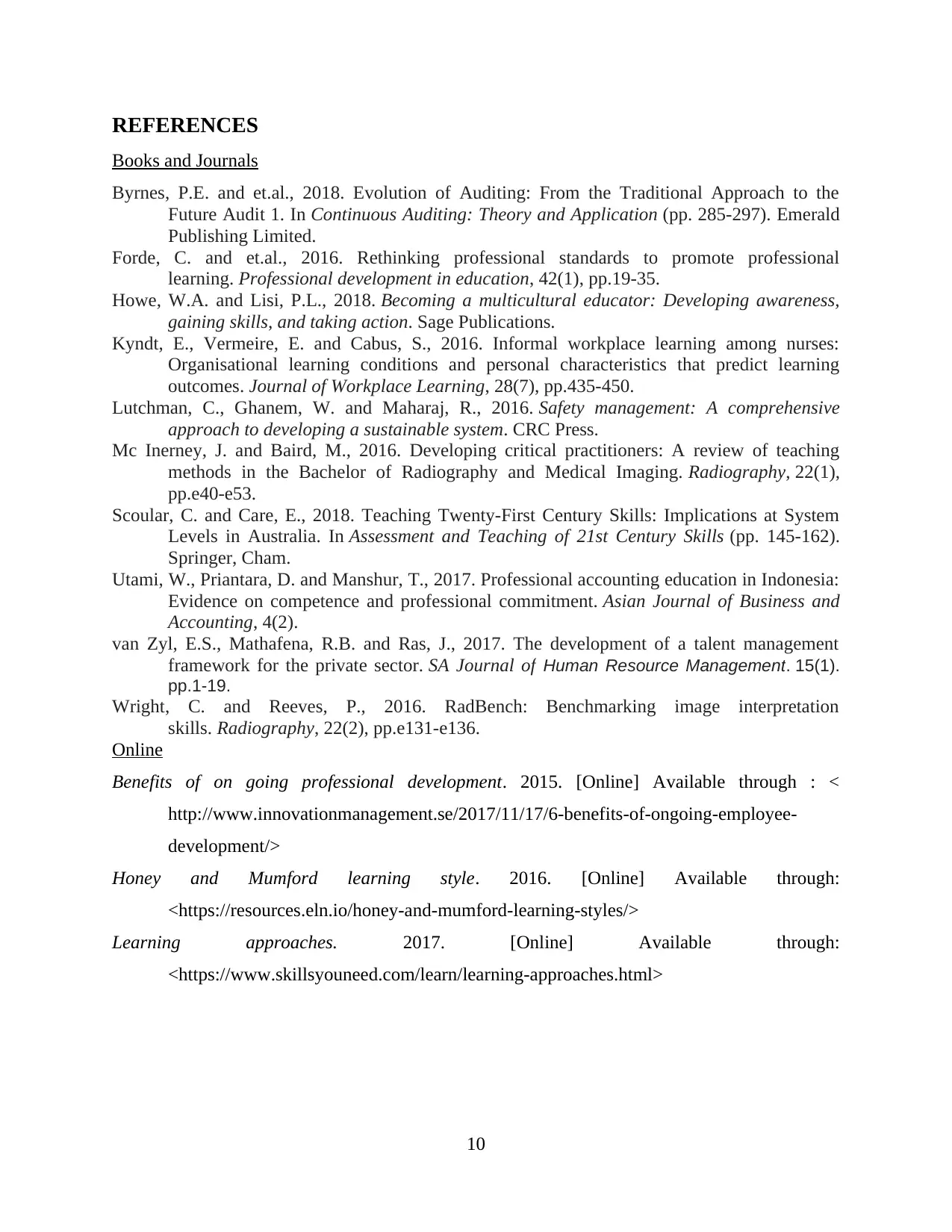
REFERENCES
Books and Journals
Byrnes, P.E. and et.al., 2018. Evolution of Auditing: From the Traditional Approach to the
Future Audit 1. In Continuous Auditing: Theory and Application (pp. 285-297). Emerald
Publishing Limited.
Forde, C. and et.al., 2016. Rethinking professional standards to promote professional
learning. Professional development in education, 42(1), pp.19-35.
Howe, W.A. and Lisi, P.L., 2018. Becoming a multicultural educator: Developing awareness,
gaining skills, and taking action. Sage Publications.
Kyndt, E., Vermeire, E. and Cabus, S., 2016. Informal workplace learning among nurses:
Organisational learning conditions and personal characteristics that predict learning
outcomes. Journal of Workplace Learning, 28(7), pp.435-450.
Lutchman, C., Ghanem, W. and Maharaj, R., 2016. Safety management: A comprehensive
approach to developing a sustainable system. CRC Press.
Mc Inerney, J. and Baird, M., 2016. Developing critical practitioners: A review of teaching
methods in the Bachelor of Radiography and Medical Imaging. Radiography, 22(1),
pp.e40-e53.
Scoular, C. and Care, E., 2018. Teaching Twenty-First Century Skills: Implications at System
Levels in Australia. In Assessment and Teaching of 21st Century Skills (pp. 145-162).
Springer, Cham.
Utami, W., Priantara, D. and Manshur, T., 2017. Professional accounting education in Indonesia:
Evidence on competence and professional commitment. Asian Journal of Business and
Accounting, 4(2).
van Zyl, E.S., Mathafena, R.B. and Ras, J., 2017. The development of a talent management
framework for the private sector. SA Journal of Human Resource Management. 15(1).
pp.1-19.
Wright, C. and Reeves, P., 2016. RadBench: Benchmarking image interpretation
skills. Radiography, 22(2), pp.e131-e136.
Online
Benefits of on going professional development. 2015. [Online] Available through : <
http://www.innovationmanagement.se/2017/11/17/6-benefits-of-ongoing-employee-
development/>
Honey and Mumford learning style. 2016. [Online] Available through:
<https://resources.eln.io/honey-and-mumford-learning-styles/>
Learning approaches. 2017. [Online] Available through:
<https://www.skillsyouneed.com/learn/learning-approaches.html>
10
Books and Journals
Byrnes, P.E. and et.al., 2018. Evolution of Auditing: From the Traditional Approach to the
Future Audit 1. In Continuous Auditing: Theory and Application (pp. 285-297). Emerald
Publishing Limited.
Forde, C. and et.al., 2016. Rethinking professional standards to promote professional
learning. Professional development in education, 42(1), pp.19-35.
Howe, W.A. and Lisi, P.L., 2018. Becoming a multicultural educator: Developing awareness,
gaining skills, and taking action. Sage Publications.
Kyndt, E., Vermeire, E. and Cabus, S., 2016. Informal workplace learning among nurses:
Organisational learning conditions and personal characteristics that predict learning
outcomes. Journal of Workplace Learning, 28(7), pp.435-450.
Lutchman, C., Ghanem, W. and Maharaj, R., 2016. Safety management: A comprehensive
approach to developing a sustainable system. CRC Press.
Mc Inerney, J. and Baird, M., 2016. Developing critical practitioners: A review of teaching
methods in the Bachelor of Radiography and Medical Imaging. Radiography, 22(1),
pp.e40-e53.
Scoular, C. and Care, E., 2018. Teaching Twenty-First Century Skills: Implications at System
Levels in Australia. In Assessment and Teaching of 21st Century Skills (pp. 145-162).
Springer, Cham.
Utami, W., Priantara, D. and Manshur, T., 2017. Professional accounting education in Indonesia:
Evidence on competence and professional commitment. Asian Journal of Business and
Accounting, 4(2).
van Zyl, E.S., Mathafena, R.B. and Ras, J., 2017. The development of a talent management
framework for the private sector. SA Journal of Human Resource Management. 15(1).
pp.1-19.
Wright, C. and Reeves, P., 2016. RadBench: Benchmarking image interpretation
skills. Radiography, 22(2), pp.e131-e136.
Online
Benefits of on going professional development. 2015. [Online] Available through : <
http://www.innovationmanagement.se/2017/11/17/6-benefits-of-ongoing-employee-
development/>
Honey and Mumford learning style. 2016. [Online] Available through:
<https://resources.eln.io/honey-and-mumford-learning-styles/>
Learning approaches. 2017. [Online] Available through:
<https://www.skillsyouneed.com/learn/learning-approaches.html>
10
⊘ This is a preview!⊘
Do you want full access?
Subscribe today to unlock all pages.

Trusted by 1+ million students worldwide
1 out of 12
Related Documents
Your All-in-One AI-Powered Toolkit for Academic Success.
+13062052269
info@desklib.com
Available 24*7 on WhatsApp / Email
![[object Object]](/_next/static/media/star-bottom.7253800d.svg)
Unlock your academic potential
Copyright © 2020–2026 A2Z Services. All Rights Reserved. Developed and managed by ZUCOL.





